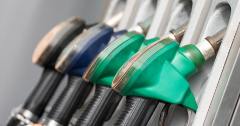What is High Octane Fuel? - Vol.130
Every car owner has wondered at some time about high-octane fuel. Whenever you pull into a gas station, you are given the choice between varying octane fuel levels. Some car owners will swear by their high-octane fuel; however, some people believe that the high-octane fuel is not necessary. So what is high octane fuel and why would you want it?

Definition
The octane number on fuel is given to help measure the performance of the fuel with the engine. The higher octane rating means that the fuel-and-air mixture in the gasoline can withstand higher compression before it detonates. This means that lower octane rated fuel will begin clunking and knocking at a much lower rate than higher-octane fuel. If you have a rattling in your engine, you may find that using a higher-octane fuel will reduce the rattling in your engine.
Myths
Many people believe that high-octane fuel will make your car "go faster." This is simply a myth – not true. Your vehicle will not go faster just because you put high-octane fuel in your car. In most cases, if your car engine is performing properly already, putting high-octane fuel in your vehicle will not show an increase in performance. Though there are some high-octane fuels that will improve an engine's combustion efficiency, you will likely not see an increase in speed and performance. However, if you have knocking or clunking in your engine, you will likely see these symptoms decrease when switching to high-octane fuel.
Do You Need It?
According to the Federal Trade Commission, most vehicles recommend regular octane fuel, not high-octane fuel; and cars will not see any benefit to using high-octane fuel. Paying the extra 10 to 20 cents-a-gallon likely has no benefit to your vehicle unless you are experience knocking or rattling in your engine. In this case, high-octane fuel has been found to decrease this knocking. However, this is not a common occurrence and therefore you should use the octane level your owner's manual recommends rather than high-octane fuel. The Federal Trade Commission also states that high-octane fuel will not make your car go faster, run "cleaner," or get better gas mileage; therefore, it is best to simply refer to your vehicle's owner's manual about which octane rating is best for your car.
Premium Gas – Is it the same octane level?
One of the other common misconceptions with regard to high-octane fuel is that "premium" gasoline offered at gas stations is all the same octane level. Again, this is not the case. There is no regulation of what octane rating fuel must have in order to be labeled "premium." In some states, premium gasoline may need to have an octane level at 92; however, another state may require only a 90 octane rating to be classified as "premium." It is important to realize that not all states or even gas stations may be the same. Therefore, if your owner's manual states a specific octane level for your vehicle, it is best to check the yellow stick on the pumps to ensure you are getting the fuel that is best for your vehicle.
It can be confusing to many vehicle owners when to use high-octane fuel and why. Therefore, it is important to know your vehicle and read your vehicles owner's manual to ensure you are giving your vehicle the octane level that is best for your vehicle. Once you have determined the correct octane rating for your vehicle, it is good to remember that, if you do hear rattling, clunking, or knocking in your engine, high-octane fuel may be a good choice until the engine is back to normal.